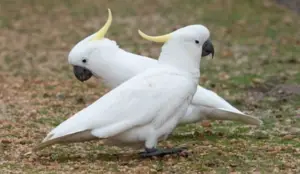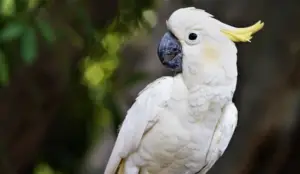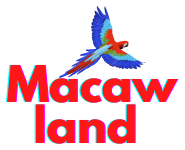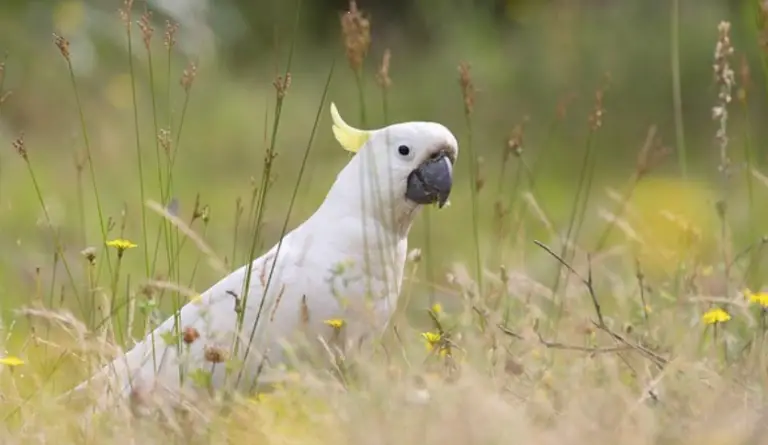The important question for bird enthusiasts and pet owners alike: “What does a cockatoo eat?” Understanding their dietary needs is crucial to bringing a cockatoo into your home or just curious about these vibrant and intelligent birds. Cockatoos, known for their striking appearance and charismatic personalities, require a specific diet to maintain their health and happiness.
In this guide, we’ll dive into the world of cockatoos, shedding light on their eating habits and nutritional requirements, both in the wild and in domestic settings. Whether you’re a seasoned cockatoo caretaker or new to the world of avian pets, this information is key to ensuring the wellbeing of these delightful birds.
What Do Cockatoos Typically Eat in the Wild?
In the wild, cockatoos primarily feast on seeds, nuts, fruits, insects, and various greens.
Cockatoos, with their diverse habitats ranging from rainforests to urban areas in Australia and surrounding islands, have a diet as varied as their living environments. They are predominantly herbivores and feed mainly on seeds and nuts, which they skillfully crack open with their strong beaks. Fruits and greens provide essential vitamins and minerals, while insects offer protein. Understanding their wild diet is crucial in replicating it for captive birds.
How Does a Captive Cockatoo’s Diet Differ from Wild Cockatoos?

Captive cockatoos often have a less varied diet than their wild counterparts, making it important to ensure they receive all necessary nutrients.
In captivity, cockatoos rely on us for their nutritional needs. Captive cockatoos often have limited options, unlike their wild brethren, who forage for various foods. It’s essential to provide a diet that mimics their natural eating habits, including a mix of seeds, fruits, vegetables, and occasional protein sources like cooked eggs or lean meats.
Essential Nutrients for a Healthy Cockatoo Diet
Ensuring that your cockatoo gets a well-rounded diet is vital for its health and happiness. Just like us, these vibrant birds need a mix of essential nutrients to thrive. Let’s break down what makes up a balanced diet for a cockatoo.
Proteins:
Think of proteins as the building blocks for your cockatoo’s body. They are essential for growth, especially in younger birds, and play a crucial role in repairing tissues and maintaining muscle health. You can provide proteins through various sources, such as cooked eggs, lean meats, and certain types of beans and legumes safe for birds.
Vitamins and Minerals:
These are the tiny but mighty components of your cockatoo’s diet. Vitamins support overall health, aiding in everything from vision to the immune system. Minerals like calcium are crucial for strong bones and beak health. While many commercial bird foods are fortified with these nutrients, incorporating fresh fruits and vegetables can also provide natural sources of essential vitamins and minerals.
Fats:
Don’t shy away from fats! They’re a critical energy source for cockatoos, helping to keep their energy levels up. Additionally, fats are important for maintaining healthy skin and feathers. However, it’s all about balance – too much fat can lead to obesity and other health issues. Offer nuts and seeds in moderation, as they are high in fats.
It’s important to note that a lack of these nutrients can lead to various health problems. Protein deficiencies might slow down growth or repair processes. Insufficient vitamins and minerals can lead to a weakened immune system or bone issues. And a lack of healthy fats can result in less energy and poor feather quality. In extreme cases, nutritional imbalances can lead to serious conditions like feather plucking and malnutrition.
Common Dietary Mistakes Cockatoo Owners Make
Caring for a cockatoo involves more than just love and attention; it’s also about understanding their dietary needs. Unfortunately, even the most well-intentioned cockatoo owners can sometimes get it wrong. Let’s delve into some common dietary mistakes to help you avoid them.
Overfeeding:
It’s easy to overfeed these birds, especially when they look at you with those endearing eyes. But just like humans, cockatoos can become obese if they eat too much. Obesity in cockatoos is not just about looking chubby; it can lead to serious health issues like heart disease, liver problems, and decreased mobility. It’s crucial to understand the right portion size for your feathered friend and stick to it.
Lack of Variety:
Cockatoos, in their natural habitat, enjoy a diverse diet. In captivity, though, their diet can become monotonous if we’re not careful. Feeding your cockatoo the same food day in and day out isn’t just boring for them; it can also lead to nutritional deficiencies. Imagine eating nothing but rice every day – you’d miss out on essential nutrients! Your cockatoo needs a mix of seeds, fruits, vegetables, and occasional proteins to stay healthy.
Harmful Foods:
This is a big one. Certain foods that are perfectly safe for humans can be dangerous for cockatoos. Avocado, for instance, contains a substance called persin, which can be toxic to birds. Chocolate is another no-go; it contains theobromine, which can cause heart problems and even death in cockatoos. It’s important to be aware of these harmful foods and keep them out of your bird’s reach.
In conclusion, when it comes to feeding your cockatoo, more isn’t always better, variety is key, and some foods are best left out of their diet. By avoiding these common mistakes, you can help ensure your cockatoo enjoys a long, healthy, and happy life. Remember, a well-fed cockatoo is a happy cockatoo!
The Role of Fresh Fruits and Vegetables in a Cockatoo’s Diet
Fresh fruits and vegetables are not just treats for cockatoos; they are essential for delivering vital vitamins and minerals that keep them healthy and lively.
When it comes to feeding your cockatoo, variety is more than just the spice of life; it’s a fundamental aspect of their wellbeing. Including a range of fresh fruits and vegetables in your cockatoo’s diet does wonders. These foods provide a powerhouse of essential nutrients that are crucial for maintaining your bird’s vibrant feathers, sharp eyesight, and overall robust health.
Fruits and vegetables do more than meet nutritional needs. They bring an array of flavors and textures into your cockatoo’s mealtime, making eating a fun and stimulating experience. In the wild, cockatoos spend a lot of their day foraging for food. This activity is not only about finding something to eat; it’s also a way for them to engage with their environment. By offering a variety of fruits and vegetables, you can mimic this natural foraging behavior, which is great for their mental health and keeps them active.
However, it’s crucial to know which fruits and vegetables are safe for your cockatoo and which should be avoided. Safe options include apples (without seeds), bananas, carrots, and leafy greens like spinach and kale, all of which are packed with vitamins and minerals. On the other hand, some fruits and vegetables, like avocado, can be harmful to cockatoos and should be avoided.
Remember, while fruits and vegetables are vital, they should only make up a part of your cockatoo’s diet. Balancing these with other food types is key to ensuring your feathered friend stays in top shape. Also, always wash fruits and vegetables thoroughly to remove any pesticides or chemicals.
The Ideal Feeding Schedule for Cockatoos
Cockatoos should be fed twice a day, with their diet closely monitored to prevent overfeeding.
Establishing a regular feeding routine is vital for cockatoos. A balanced diet offered in the morning and evening, with portions adjusted according to the bird’s size, age, and activity level, helps maintain optimal health. Consistency is key to prevent overfeeding and obesity.
Homemade Cockatoo Diets vs. Commercial Diets

When it comes to feeding your cockatoo, you might wonder whether to go for a homemade diet, rely on commercial foods, or mix both. It’s a decision that depends largely on your ability to provide a well-rounded and nutritionally complete meal for your feathered friend.
Homemade Diets:
Preparing your cockatoo’s food at home allows you to offer a wide variety of fresh and wholesome ingredients. You can include fruits, vegetables, grains, and proteins that you know are safe and healthy for your bird. This variety caters to their nutritional needs and keeps mealtime interesting for them. However, the challenge with homemade diets lies in ensuring that you’re meeting all the nutritional requirements of your cockatoo. Birds need a delicate balance of vitamins, minerals, proteins, and other nutrients to stay healthy. There’s a risk of nutritional gaps or imbalances without proper knowledge and care.
Commercial Diets:
On the other hand, commercial diets are specifically formulated to meet the nutritional needs of cockatoos. Manufacturers ensure that these diets include the right balance of nutrients necessary for a bird’s health. This takes away the guesswork and worry about whether your cockatoo is getting everything it needs. However, the downside is that some commercial diets can be monotonous for your bird. For instance, a diet consisting solely of pellets doesn’t offer much excitement or variety, which is important for a cockatoo’s mental stimulation and overall well-being.
Combining Both:
Many cockatoo owners find that a combination of homemade and commercial diets works best. You can rely on commercial foods for their balanced nutrition and supplement them with a variety of fresh fruits, vegetables, and occasional treats to add excitement and extra nutrients to your cockatoo’s diet. This way, you’re ensuring that your bird is not only getting all the necessary nutrients but also enjoying a diverse and stimulating diet. Remember, when adding fresh foods, it’s important to research and ensure that each item is safe for cockatoos to eat.
How to Introduce New Foods to Your Cockatoo
Start slowly with small portions of new foods, and keep an eye on how your cockatoo responds.
- Start Small: When it comes to new foods, the key is to begin with just a tiny amount. This can be as simple as adding a small piece of fruit or vegetable to their regular food. The idea is to not overwhelm your cockatoo but to gently introduce them to new flavors and textures.
- Observe Your Bird: Every cockatoo is unique in its tastes and preferences. Some may dive right into new foods with enthusiasm, while others might be more cautious. Pay close attention to how your bird interacts with the new food. Are they curious? Do they taste it and then ignore it? Or do they seem to enjoy it right away?
- Patience is Vital: Don’t be discouraged if your cockatoo doesn’t take to the new food immediately. Birds, much like humans, have their own tastes and sometimes need time to get used to new flavors. It might take several attempts over a few days or even weeks for your cockatoo to accept a new food item.
- Monitor Health Signs: While trying out new foods, it’s essential to watch for any changes in your cockatoo’s health. This includes their energy levels, the quality of their feathers, and their droppings. Any negative changes could indicate an allergy or intolerance to the new food. If you notice anything unusual, it’s best to stop offering that food and consult with a vet.
- Mix with Familiar Foods: One effective strategy is to mix the new food with something your cockatoo already likes. This could help them become more comfortable with the new taste and texture. For example, mixing a new type of vegetable with their favorite fruit might encourage them to try it.
- Consistency and Variety: Consistently offering new foods, even if your cockatoo doesn’t accept them right away, is important. It helps them get used to the idea of variety, which is crucial for a balanced diet. However, ensure that any new additions are safe and suitable for cockatoos.
- Positive Reinforcement: If your cockatoo tries or accepts the new food, offer them praise or a favorite treat. Positive reinforcement can make the experience enjoyable and encourage them to be more open to trying new things in the future.
Understanding Cockatoo Foraging Behavior and Its Dietary Implications
Replicating foraging behavior in captivity is important for mental stimulation and dietary variety.
In the wild, cockatoos spend a significant amount of time foraging for food. Replicating this behavior through food puzzles and hidden treats can provide mental stimulation and encourage natural eating behaviors, enhancing their overall well-being.
FAQ about cockatoo eat
What are some toxic foods to avoid in a cockatoo’s diet?
Avoid avocado, chocolate, caffeine, and foods high in salt and sugar.
Can cockatoos eat a purely vegetarian diet?
Yes, but it must be well-balanced to ensure they receive all necessary nutrients.
How do I know if my cockatoo is getting the right nutrition?
Monitor their energy levels, feather quality, and overall health. Regular vet check-ups are also important.
Are there any special dietary considerations for baby cockatoos?
Baby cockatoos require a diet higher in protein and certain vitamins for growth.
How can I prevent obesity in my cockatoo through diet?
Monitor portion sizes, avoid high-fat foods, and ensure they get enough exercise.
Conclusion
Exploring the dietary habits of cockatoos opens up a fascinating aspect of their care and well-being. Understanding what a cockatoo eats is not just about fulfilling their basic needs; it’s about enriching their lives and ensuring their health and happiness. A balanced and diverse diet is key, from various seeds, nuts, fruits, and vegetables to the occasional treat. Whether you’re a long-time cockatoo owner or just starting to learn about these captivating birds, remembering the importance of their diet is essential.
By providing the right nutrition, monitoring their health, and introducing new foods patiently, you’re not just feeding a bird – you’re nurturing a companion. So, as we wrap up our journey into cockatoos and their diets, let’s carry forward the commitment to understanding and meeting the dietary needs of these remarkable creatures.

Hi, I’m Regina Rios. Just another bird lover who loves to share knowledge from personal experience. I’ve grown up with pet birds since childhood as my mommy also loves birds. As I can’t pet many birds in open air in my house as my mom does; I created my first bird cage on my rooftop using wood, copper wire, and a metal shed in 2018 and start collecting pet birds. Now, I have so many pet birds such as Macaws, Parrot, Cockatiel, Parakeet, and others. Not only that, if I see natural birds are injured I keep them in my house until they get well. Now, my hobby becomes my income source as my home birds have babies and I sell them to birds lover like mine. I’ve created this blog to inspire others bird owners by sharing my personal knowledge. Good Luck!

